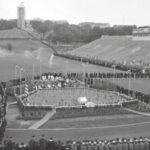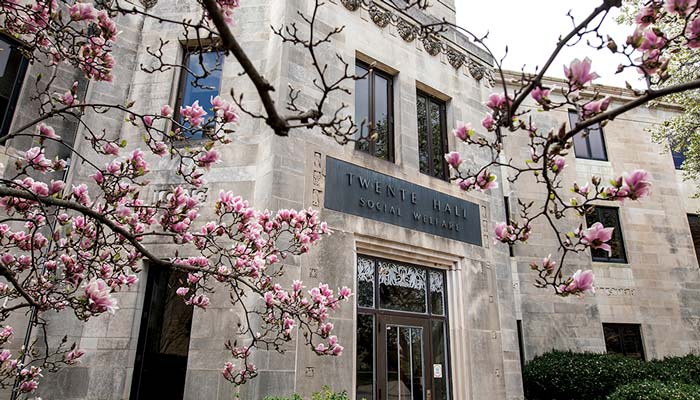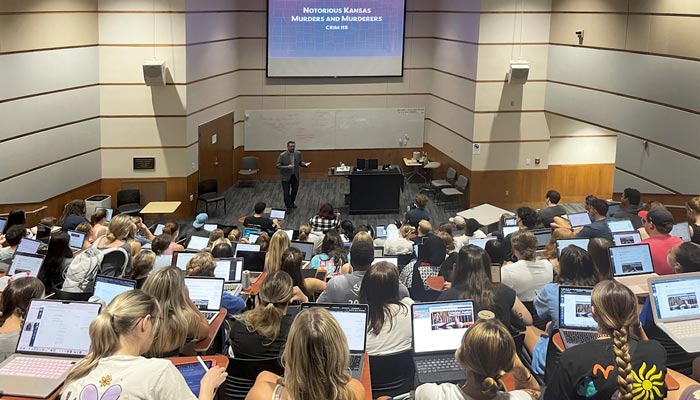Lift the Chorus
Letters from our readers
An issue to remember
Kansas Alumni is always a welcome sight in our mailbox. The Spring issue was particularly heartening. The cover is fantastic, a reminder that even during unprecedented and uncertain times, our University is learning distance right alongside its students and alumni.
When I flipped to the First Glance spread, I was struck by the re-imagined Uncle Jimmy Green statue in front of Lippincott Hall. Kudos on a creative and befitting depiction of life 6 feet apart. I will be saving this image to show future generations of Jayhawks.
–Caroline Koch Gollier, c’00, j’00
Lawrence
The Spring Kansas Alumni was especially meaningful and poignant. Such heartfelt stories. It made me especially proud to be a KU alumnus. Thank you!
–James Doepke, d’74
Estero, Florida
Gold linings
I was born and raised in Maryville, about an hour north of Manhattan and generally considered K-State country. When I graduated from Maryville High School, in 1968, four of our class of 90-some went to KU. I’d guess four or five times that many went to K-State.
I recently learned from my hometown newspaper that of the 2020 class of 77, eight are headed to KU and six to K-State. I don’t think that’s ever happened. Kudos to KU Admissions for taking the KU message into the heart of Wildcat country, with impressive results. I was so excited I sent each KU kid a letter and a check as a graduation present, even though I don’t know any of them or their parents.
I’m sorry they didn’t have a traditional May graduation, and I told them I could relate. My KU undergraduate walk down the Hill in 1972 was moved indoors because of threatening rain. I’d been waiting for that walk for four years and was so angry when it didn’t even rain. I joked that I came back to KU to get my master’s and law degrees mostly so I could finally make the walk. Well, that and the fact that I managed to milk 13 years of student-priced football and basketball tickets.
It took a couple of decades for my perspective to change and to realize that my class was one of only three to graduate in the hallowed environs of Allen Field House. I still remember that day. The floor was dirt, with the portable basketball floor only installed during the season. Our class was still small enough that we all processed across the stage to receive a fine campus photo, which I still display. Dust from the floor rose to envelop the arena in a brown haze.
I hope the 2020 alumni of Maryville High and KU learn to accept changed circumstances and find the golden lining in a dusty cloud.
–Larry Tenopir, d’72, g’78, l’82
Topeka
One vote for the Electoral College
I would like to comment on the article “How we vote, and why,” about Professor Emeritus Paul Schumacher’s book, The 28th Amendment? Beyond Abolishing the Electoral College [Rock Chalk Review, issue No. 2]. I believe this book needs a rebuttal. This is an important issue.
I have read several articles regarding the benefits of the Electoral College. I believe that our Founding Fathers knew what they were doing when writing the Constitution. The Electoral College gives more votes to states with higher population. They developed this process to give each state input in the election. According to an article by Allen Guelzo in National Affairs, the Electoral College was designed to counteract the worst human impulses and protect the nation from the dangers inherent in democracy. The Electoral College helps preserve our constitutional system. The United States is a constitutional republic, and the Electoral College is the only method specified by the Constitution to elect the president. We structure everything in our political system around a federation that divides power between states and the federal government.
The Electoral College contributed to ending slavery, since Abraham Lincoln received only 39.9% of the popular vote in 1860 but won the Electoral College. The Electoral College is cumbersome, but the Constitution didn’t try to have a streamlined national government. The founders were more interested in liberty than efficiency. The Constitutional Convention saw that the Revolution produced hyperactivity in state governments that wanted to make everything into one man, one vote.
The Electoral College forces candidates to campaign to a wider range of voters. Clinton’s popular majority vote in 2016 came from California with help from Illinois and New York. Voter fraud may be discouraged by the Electoral College. If the election was determined by simple majority, fraud could be prevalent in every state. Also, there could be dozens of candidates without the Electoral College. An elected president could then have a small percentage of the vote to obtain power over the whole country.
People who live in urban regions lean Democratic, and the rural areas lean Republican. This could lead to a few populous states dictating our president in every election, if we used a popular vote. With an Electoral College each state can have input.
This country has endured for 200-plus years because of the Constitution. Why should we want to change something that has made our country great?
–James Rosander, p’64
Shawnee
Your opinion counts
Please email us a note at kualumni@kualumni.org to tell us what you think of your alumni magazine.








